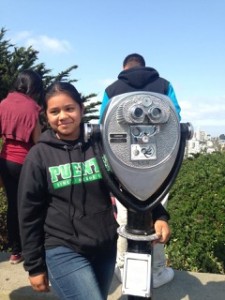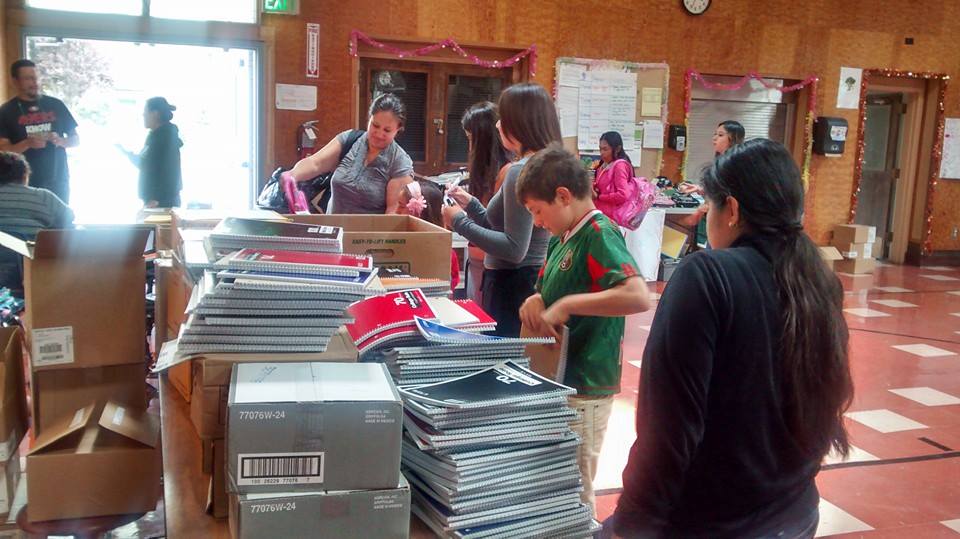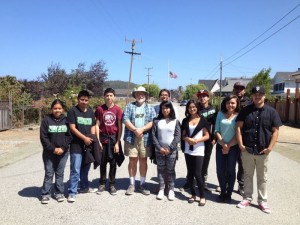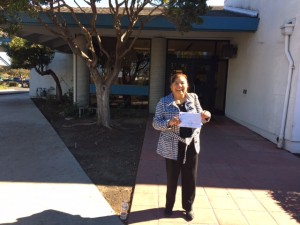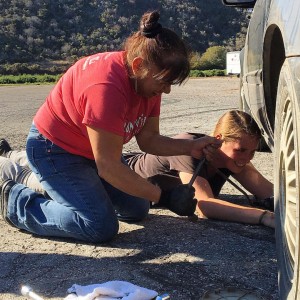Some youth succeed due to their early circumstances. Others succeed in spite of them.
Odalys Nabor is 14. She lives in a rented trailer in a rural patch of Pescadero with her mother, stepfather, twin brother and 3-year-old sister; her brother often sleeps on a couch in the living room.
For Odalys, who struggles in school, getting homework done is an act of willpower. Home life can be so noisy and crowded that she sits under a tree to complete her assignments – it’s her quiet place. Her parents don’t speak English, so they can’t lend a hand when she needs it. Odalys also minds her younger sister for her parents, her mom works long hours at a flower nursery in Half Moon Bay.
When she started at Pescadero High School this September, Odalys knew she was in trouble. “It was hard at the beginning. I’m not really that good in English and I was placed in an intensive English class. Also I didn’t understand the work,” she says. Odalys is an intensely shy young woman when you meet her; petite and soft-spoken with a thick ponytail and serious eyes.
So Odalys went outside of her comfort zone this fall. She came to Puente and asked for help with her schoolwork. Puente has a network of volunteer tutors who work with youth for as long as they need the support. The relationship between student and tutor can make the difference between passing and failing in high school, and later, when choosing to pursue a college education.
“I just want to get good grades. I just want to improve,” says Odalys, quietly. “People at Puente say it’s not good to screw up in your first year, because it’s harder to get up on your feet after that.”
Odalys was paired with Kasey Butler, one of Puente’s volunteer tutors. In the span of just a few months, her grades in math and English have improved from Ds to Cs – a huge point of pride for Odalys.
But what really started making a difference is Odalys herself. Her perspective simply changed.
Rita Mancera traces that change back to this summer, which was the first time Odalys participated in Puente’s Youth Leadership and Development Program. “When she started this summer, she would not speak much,” says Mancera, Deputy Executive Director of Puente.
Odalys learned to use her voice, slowly, in working as an assistant to Abby Mohaupt, Puente’s Faith Community Liaison and Volunteer Coordinator. Odalys had tasks around the office that brought her into contact with the public: answering telephones, handing out flyers, staffing the front desk. She organized school supplies for Puente’s annual backpack distribution day, a major task. She was responsible and reliable, always showing up on time and ready to work, a skill that she continued to show after the summer program.
“I watched her become more assertive and want to find ways to push our program,” observes Mohaupt. She and Odalys bonded over the fact that they are both twins. As they got to know each other, Mohaupt discovered Odalys’ quiet sense of humor.
Later that summer, Mohaupt started taking Odalys to the Pescadero Grown! Farmers’ Market on Thursdays. They had a special mission: to walk around and talk with every single farmer. “I told her we were doing it so we could practice talking with strangers. She never liked it, but she did it anyway,” Mohaupt says.
The combination of encouragement and responsibility worked, because that summer, Odalys started applying herself more than ever. Each student enrolled in the Pescadero High School needs to read two books over the summer and complete book reports and vocabulary sheets. It’s meant to help students start the year with good grades in English, but many local Latino students find reading and writing very challenging and struggle to complete the assignment before school starts.
Odalys, who had poor grades in English, started reading and didn’t stop. Not only did she finish her assignment early, she was second out of the entire youth program cohort to do so.
Not only that, but by the end of the summer 22 out of 24 youth had completed their reading assignments. Shannon White, a high school teacher from Indiana and Omar Ortega spent every day working with the teens over the summer.
“Our youth are growing, and we get them at a time when they develop their character and we provide a space or them to grow in the most positive way,” says Mancera. “They’re at the age where they can choose. Almost every youth who works with us chooses the right path and they work hard at their school work.”
Odalys now appears determined to build on her early traction, going straight to Puente after school to complete her schoolwork. She also works part time with Puente, providing childcare during evening ESL classes. She spends some of her earnings on school materials, like a tablet she bought to help her do her homework.
Mancera says she can tell Odalys will go to college. It all started with the act of asking for help: the instinct to succeed, in spite of life’s limitations.
“I think she’s absorbing it all in her quiet way. A lot of the youth leaders here, they’re so loud and extroverted. She’s less vocal but she’s just as much of a leader,” says Mancera.
Puente needs your support this winter as we raise funds for our Youth Leadership and Development Program. You can make a real difference in the live of youth like Odalys. Please click here to donate. Thank you!.

